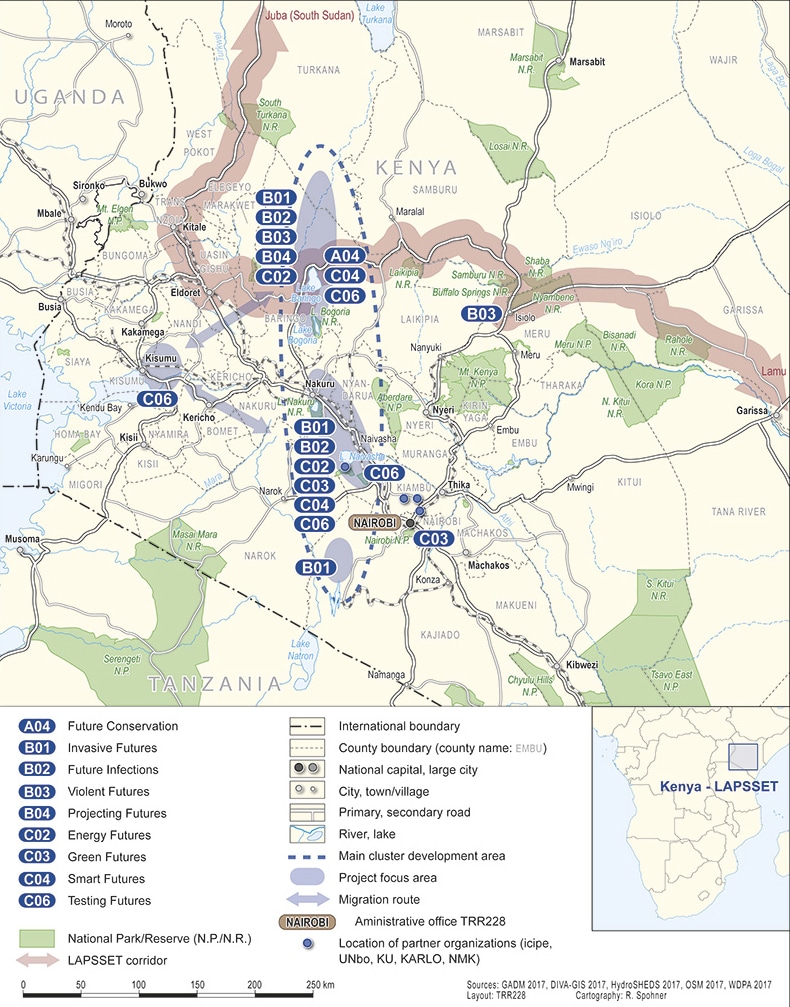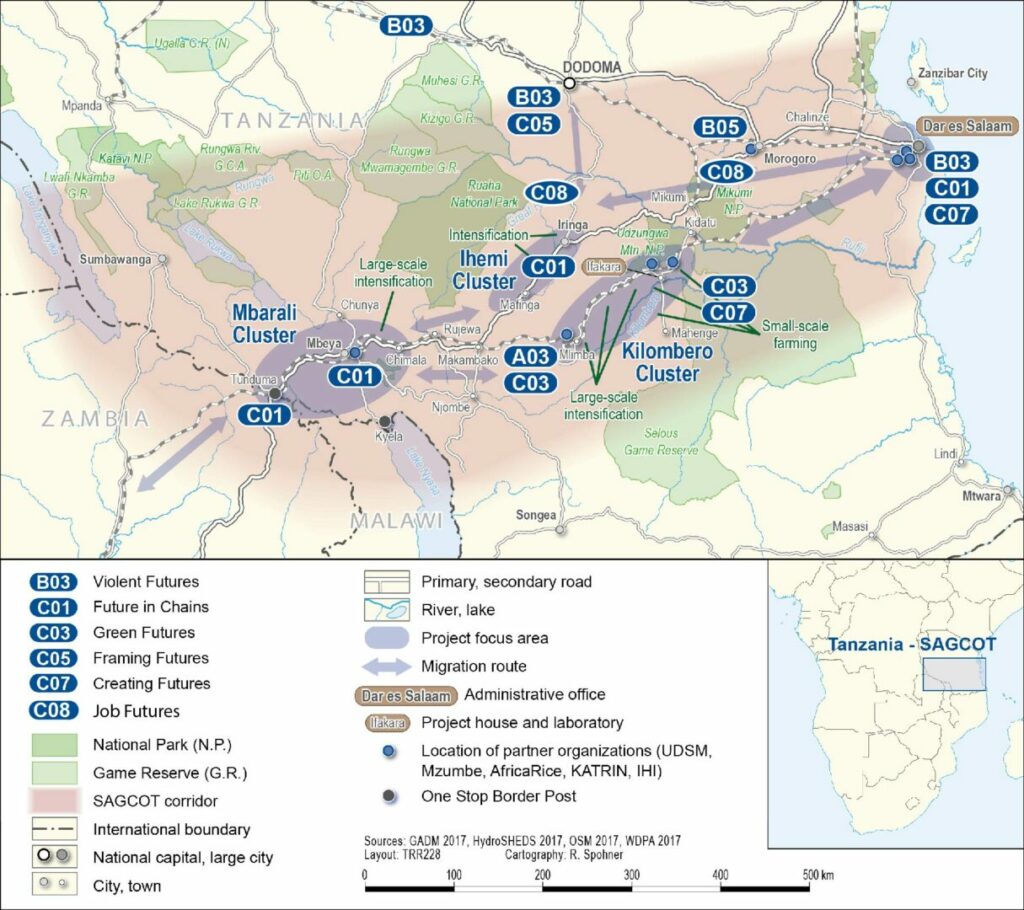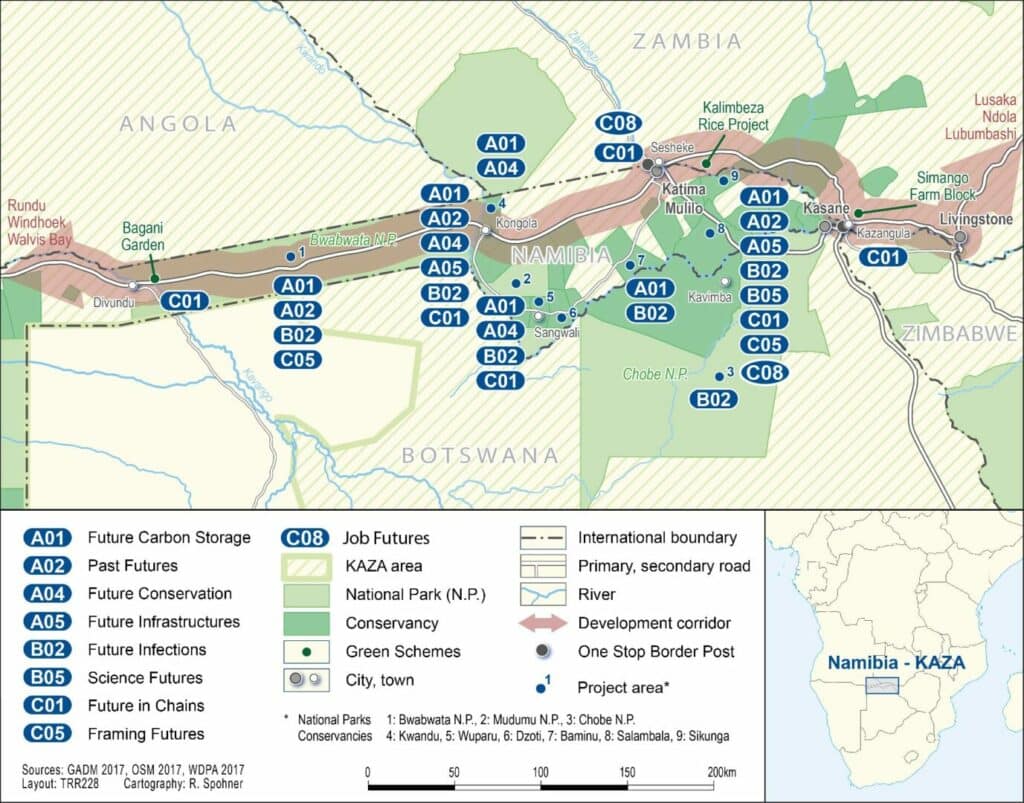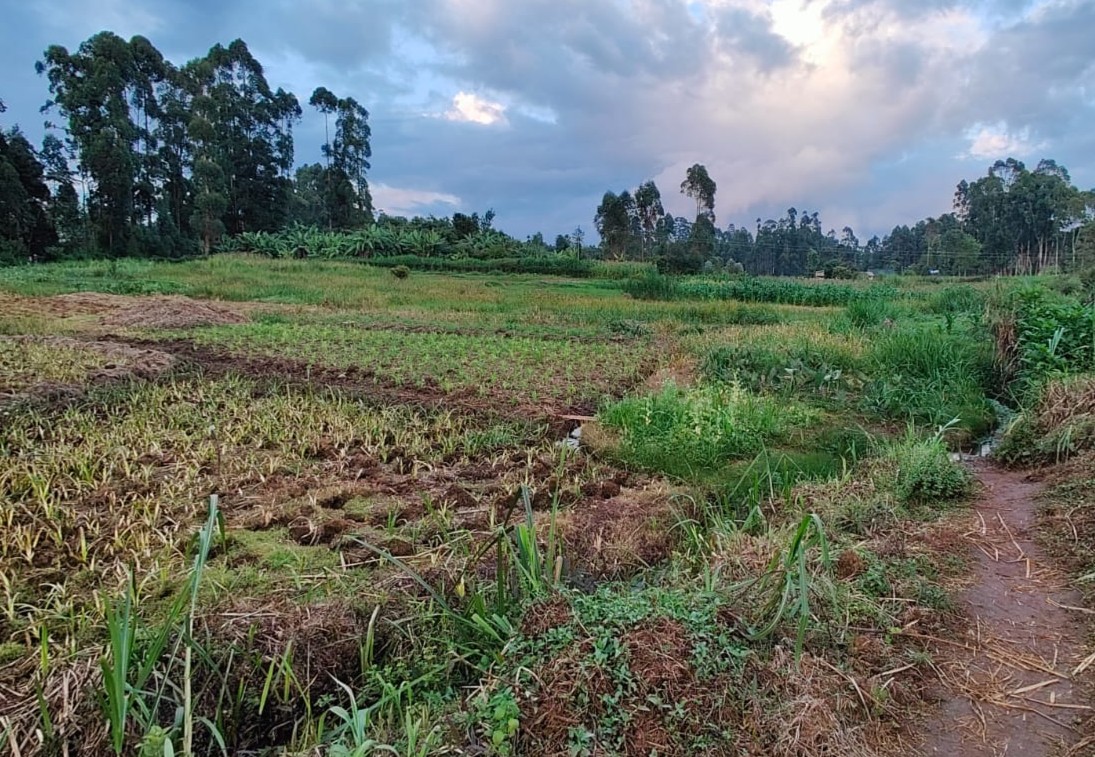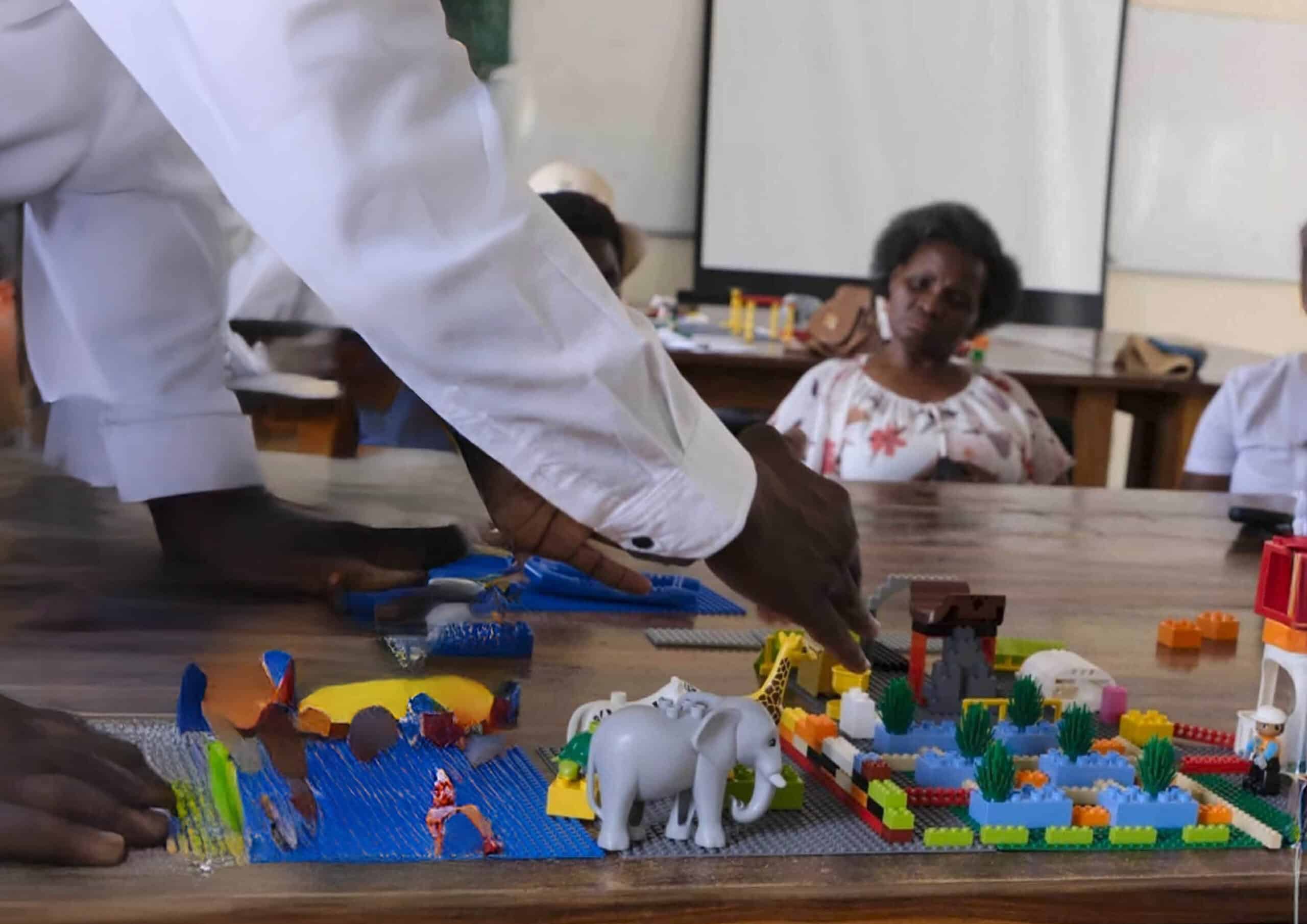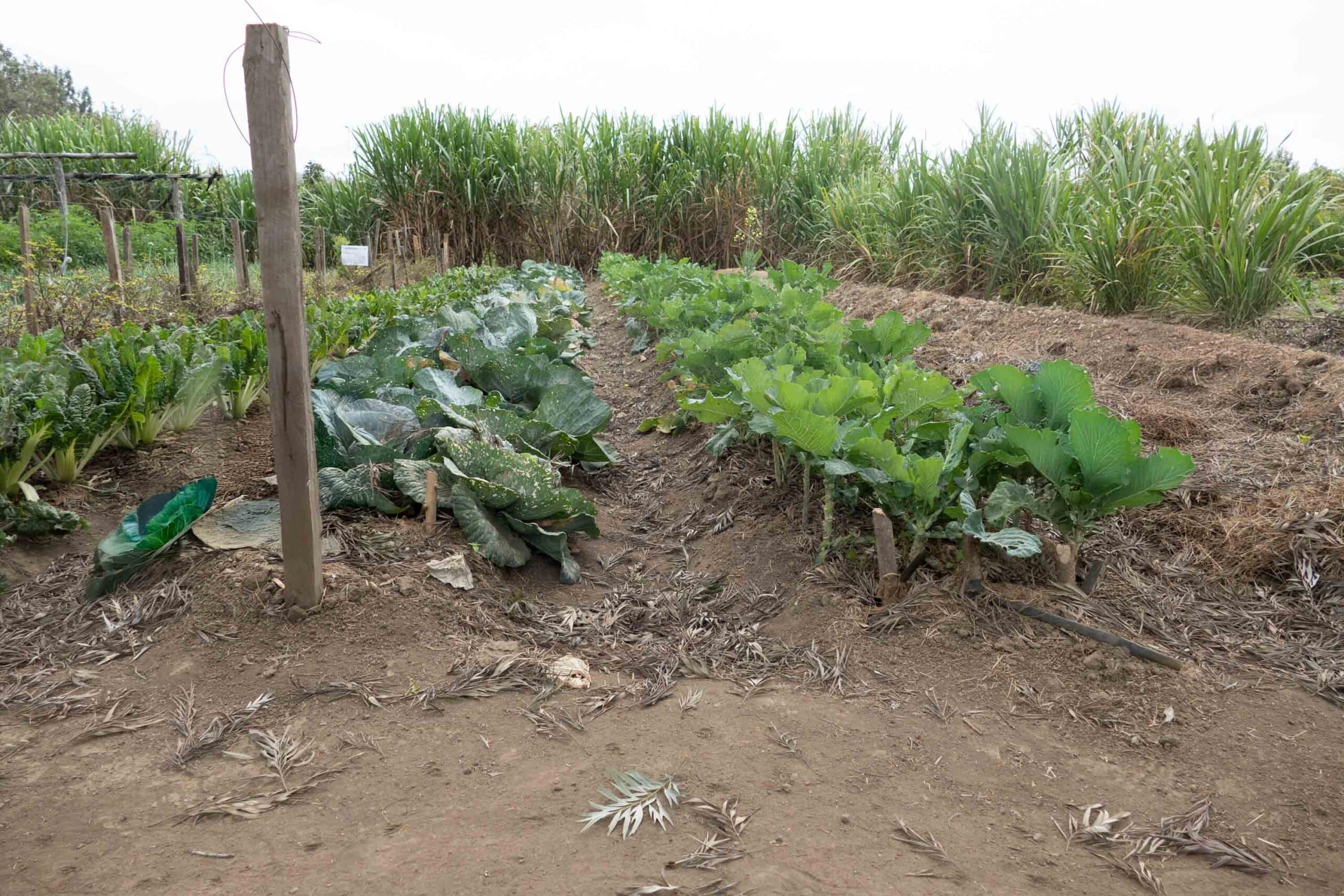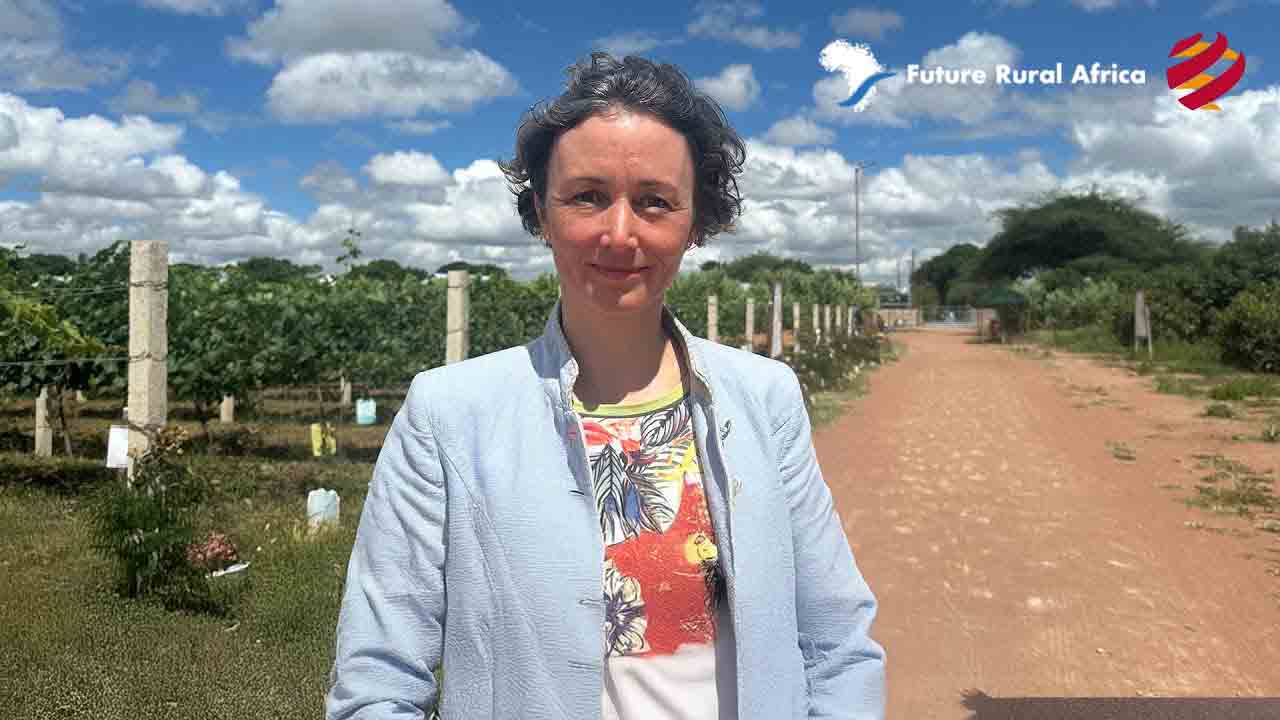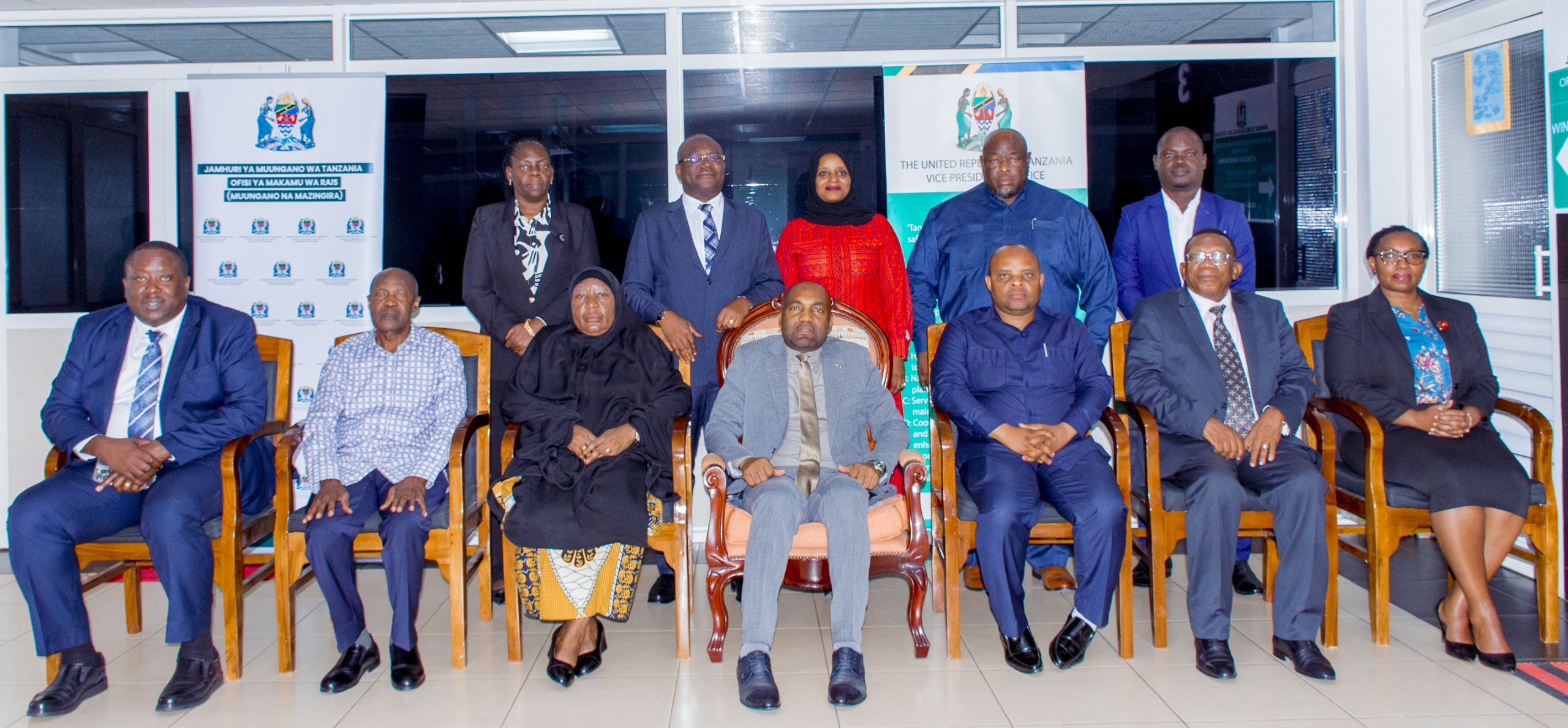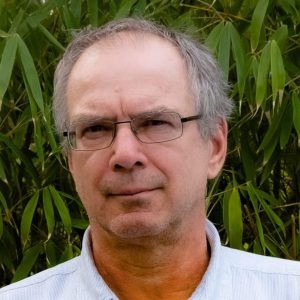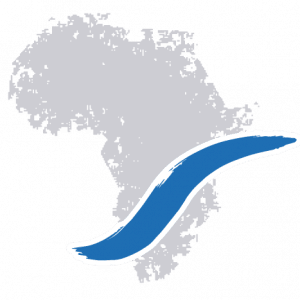CRC TRR 228 Project B05
Science Futures
Between “intensification” and “conservation”discourses on African rural development
B05 Science Futures
Vision
To recognize the role that scientific and non-scientific knowledge systems play in the imagination and pursuit of rural futures in Africa, by considering the political economy and ecology of knowledge production, transfer and use, while actively pursuing epistemological breakthroughs crucial to sustainable development benefitting local populations.
Project Summary
The project “Science Futures” proposes to study the role of science in the design of and decisions about the futures of rural Africa, using the examples of development corridors in general and agricultural production technology therein. It recognizes that scientific and non-scientific modes of knowledge creation, transfer and use play a crucial role in imagining particular futures and in taking active steps towards their realization. Within the studied, largely remote rural spaces which the corridors link to broader national developments in the fields of agriculture, energy or tourism, science-enabled discourses of economic “intensification” through high-level use of resources such as land, water, external inputs and capital assets versus “conservation” and more ecological sustainability-oriented management practices shape societal negotiation processes aiming at diverse “rural futures”. Intensification and conservation discourses may both use scientific and non-scientific knowledge, so both kinds are taken into account while focusing on science. The empirical focus lies on territorially defined models of development (i.e. corridors) and the role of (a) spatial-planning-related knowledge systems in the genesis and current position of the corridor approach in Sub-Saharan Africa, as well as (b) agricultural scientific knowledge systems that shape the internal development dynamics and future-oriented contestation processes. Conceptually the project is inspired by Science and Technology Studies and Innovation System research, as well as discussions in the Sociology of Knowledge linked with Political Economy approaches. Methodologies include qualitative, ethnographic research and systematic quantitative (scientometric) analysis of scientific knowledge produced in the two topical areas, as well as a discourse and network analysis on genesis and actual shaping of the corridors through local policy-making. The project will conduct comparative research in and on all three CRC focus regions in Kenya, Tanzania, and Namibia in order to detect generalizable patterns of the role of science for spatial planning and agriculture in these different corridor/regional development concepts. They bear very different constellations of intensification versus conservation, strength of national science systems, role of agriculture versus other sectors, and involvement of private sector and external/international experts. In perspective, the assessment of the knowledge systems which determine how the pursued development models unfold lays the foundation for a knowledge communication, transfer, and diffusion strategy to be developed as part of the CRC’s third phase.
Research Regions: Tanzania, Kenya, Namibia
Problem Statement
The state of knowledge and knowledge systems shaping decisions regarding the futures of rural Africa is characterized by fragmentations, contestations, and hierarchies. Scientific and non-scientific modes of knowledge creation, transfer and use influence the impact of economic “intensification” discourses, and that of the more ecologically, sustainability-oriented “conservation” discourses. In growth corridors, these discourses are embedded in both spatial- planning-related knowledge systems and agricultural knowledge systems influencing internal development dynamics, negotiations and contestation processes of rural futures. In order to guarantee that knowledge benefits – rather than hinder – local livelihoods, detailed investigations into the political ecology of these knowledge systems, their related discourses and how they influence the futures of rural Africa is needed.
Key Questions
- How are scientifically informed discourses, science-to-policy interfaces, and scientific/non-scientific knowledge systems contributing to future-making in rural Sub-Saharan Africa?
Methodology
- Scientometric analysis and content analysis
- Informant interviews with stakeholders
- Quantitative survey of local household members
- Social foresight methodology, framed as the ‘adults play, futures unfold’-approach
- Tracer study of graduates of agricultural faculties and analysis of agricultural higher education reform needs, including quantative on-line survey, focus group discussions, expert interviews and literature/document review
Outlook for Phase III
“Science Futures” studies science-policy interfaces (SPIs) in Kenya and Tanzania. Building on the preceding project (2022-2025), we examine science-based policy advice, transfer and dialogue between researchers and decision-makers in those rural development contexts that have been most intensively worked on in the CRC. We ask what constitutes different forms and formats of science-based policy advice, and how it is structured and practised in the three domains of agriculture, infrastructure, and education. Conceptually and empirically, we distinguish two channels of knowledge transfer: (a) the leading national research universities and their role in mediating national advisory processes, e.g. by enabling faculty and associated researchers to engage in communication and consulting activities, and (b) the role of international organizations, NGOs and international research institutions in advisory processes to the governments of Kenya and Tanzania.
With this two-pronged approach to empirically studying SPIs in both countries, our project will enable a better understanding of how scientists and policymakers conceptualize and coproduce “rural futures”. While universities contribute various forms of knowledge to high-level science-based policy advisory processes nationally, they also train future change-makers and decision-makers – i.e., those actors that stand in the centre of theories of change. This scienceto-society transfer shapes the SPIs from within the nationally embedded systems of expertise, while international actors shape the SPIs from the outside. As found during the first project phase, international organizations ranging from financial institutions (e.g., World Bank) to bilateral implementing organizations (e.g., USAID, DFID) and international research institutes (e.g., the Consultative Group on International Agricultural Research, CGIAR) were involved in the design and implementation of the Southern Agricultural Growth Corridor of Tanzania (SAGCOT). To analyse these processes, we ask in the third phase of the CRC: how are the SPIs structured officially (de jure) and how do they function in practice (de facto)? Which organizations, groups and actors are influential in these interfaces? What kind of knowledge and expertise travels successfully between the spheres of science and politics, and how is this knowledge developed further? Where are vested interests carried into advisory formats and how do national governments negotiate the dynamics between subject-oriented expertise and interests?
Conceptually, the research will draw on discussions in Science and Technology Studies (STS), Higher Education Studies, Science Policy and Innovation Studies, and the Sociology of Knowledge Approach to Discourse (SKAD) employed already in the previous project phase. Methodologically, the project relies largely on qualitative social science methods, ranging from semi-structured (expert) interviews and participant observation, to discourse and document analyses. In addition, a bibliometric analysis will be conducted to capture the scope and structure of scientific and non-scientific knowledge production – including forms of local knowledges. Using multiple sources, it will assess which stocks of expertise, lines of argument and policy narratives “travel” in the sense of guiding actors in their decision-making processes and co-producing “rural futures”.
Finally, B05 takes on a coordinating role in cooperation with B03 and B06 in the field of policy dialogues and transfer activities of the CRC as a whole.
Key Findings from Phase II
The study of agricultural development in corridors confirmed the existence of fragmentations, contestations, and hierarchies in the use of scientific and other sources of knowledge. A scientometric analysis highlights the underexplored roles of globalization, climate change, and environmentalism in shaping development corridors in general, while also noting the influence of power imbalances in global science and publishing networks in favour of non-african sources. The dominance of particular funding institutions and organisations is repeatedly criticised but not systematically analysed. At the level of an individual corridor like SAGCOT, we find that it is driven by political will at the highest level and show how shifting visions led to ‘implementation hiccups’ and a volatile cycle of hype, almost abandonment to a ‘ghost project’ and resurrection. Within the corridor, scientific knowledge and planning expertise play a crucial role in the negotiation of land ownership and tenure in the corridor, inducing dynamic changes across gender, generation and class divides. Further down the corridor hierarchy, individual targeted economic activities such as the avocado value chain are shaped by political regimes and particularly by private sector knowledge. Finally, outside such new development hubs smallholder farmers continuously assess and compare traditional practices with modern methods a far as these are available, leading to hybrid forms of knowledge. Indigenous knowledge and practices proved to be fairly resilient to both colonial and post-colonial modernisation influences, often due to their better adaptation to local and economic realities. However, under changing conditions and objectives of production 'epistemic voids' are observed where such local knowledge systems lack sufficient support from external agricultural expertise. Overall, the findings call for a rethinking of the relationship between scientific and other forms of knowledge (local, business), a more inclusive terminology of knowledge that avoids normative judgements, and a focus on the dynamics of hybridisation and reciprocal learning processes that yield locally adapted solutions and forms of expertise matching local ‘windows of opportunity to innovate’.
Relation to the CRC
Negotiations and contestations involving multiple visions, interests and power struggles are shaping the futures of rural Africa. An analysis of the political economy and ecology of knowledge systems focusing on scientific and non-scientific knowledge production, transfer, and use allows to confront the epistemological dynamics at the center of future-making. With reference to spatial-planning-related knowledge systems and agricultural scientific knowledge systems, Science Futures puts the spotlight on the epistemic struggles (and possibly breakthroughs) of future-making in rural Africa.
Publications
Akman, M.S., Botti, F., Brandi, C.; Brüntrup, M., Dietrich, M., Espa, I., Freytag, A., Koopman, R., Mildner, S.-A., Rudloff, B. 2022, Sustainable and Resilient Agricultural Value Chains: Addressing Multiple Vulnerabilities with a New Partnership Approach, Think7 Policy Brief. Link
Brüntrup, M. 2025. Another setback for multilateral environmental and resource protection. Rural 21 01/2025.
Brüntrup, M. 2020. ‘Agricultural growth corridors in sub-Saharan Africa – new hope for agricultural transformation and rural development? The case of the Southern Agricultural Growth Corridor of Tanzania’, in R Sikor, ER Terry, LG Vlek Paul & J Chitja (eds), Transforming agriculture in Southern Africa, Routledge, New York, pp. 258-270.
Brüntrup, M. 2019. Agricultural growth corridors in sub-Saharan Africa, in: Sikor, R., Terry, E. R., Vlek. P. L. G., Chitja, J. (eds.), Transforming agriculture in Southern Africa, New York: Routledge, 258–270.
Brüntrup, M., Schwarz, F., Absmayr, T., Dylla, J., Eckhard, F., Remke, K., & Sternisko, K. 2018.‘Nucleus-outgrower schemes as an alternative to traditional smallholder agriculture in Tanzania–strengths, weaknesses and policy requirements’, Food Security, vol. 10, no. 4,pp. 807-826.
Chan, S., Bauer, S., et al., Hornidge, A.-K., et al., Pettorelli, N. 2023. The global biodiversity framework needs a robust action agenda. Nature Ecology & Evolution, 7, 172–173. DOI
Chomboko, D., Theodory, T., Brüntrup, M., Shillingi, V., Kativu, S. N., & Hornidge, A. K. 2025. Indigenous knowledge for sustainable food security in Turiani division, Tanzania. Cogent Social Sciences, 11(1). DOI
Follmann, A., Dannenberg, P., Baur, N., Braun, B., Walther, G., Bernzen, A., Börner, J. Brüntrup, M., Franz, M., Götz, L., Hornidge, A-K., Hulke, C., Jamali Jaghdani, T., Krishnan, A., Kulke, E., Labucay, I., Nduru, G. M., Neise, T., Priyadarshini, P., Revilla Diez, J., Rütt, J., Scheller, C., Spengler, T., Sulle, E. 2024. Conceptualizing Sustainability and Resilience in Value Chains in Times of Multiple Crises—Notes on Agri-Food Chains. DIE ERDE
Hornidge, A.-K. 2019. Konstruierte Ortsungebundenheit und Körperlichkeit in Orten der Wissenschaft, in: Reichertz, J. (ed.) Grenzen der Kommunikation, Velbrück, 165-175
Hornidge, A.-K. 2014, ‘Wissensdiskurse: Normativ, Faktisch, Hegemonia’, Soziale Welt, vol. 65, pp. 7-24.
Hornidge, A.-K., Berger, A. 2023. Why ‘South’/‘North’ Framings Are Not Useful in a Shifting World Order. CEBRI-Journal 2(8), 217–237. DOI
Hornidge, A.-K., Brüntrup, M. 2022. Afrikas anschwellende Hungerkrise: Was können G7 und G20 dagegen tun? Welternährung.
Hornidge, A.K., Herbeck, J., Siriwardane, R. & Flitner, M. 2020. ‘Epistemic Mobilities: Following Sea-level Change Adaptation Practices in Southeast Asian Cities’, American Behavioural Scientist, vol. 64, no. 10, DOI.
Hornidge , A.-K., McDonald-Baertl, A. J., Pieterse, E. 2023. Science and Digitalization for a Better Future, Issue Paper Think7 Advisory Process (Japan).
Hornidge, A.-K. Partelow, S. Knopf, K. 2023. Knowing the ocean: epistemic inequalities in patterns of science collaboration, in: Partelow, S., Hadjimichael, M., Hornidge, A.K. (eds.) Ocean governance knowledge: systems, policy foundations and thematic analyses, Cham: Springer Nature, 25-45.
Ittner, I., Hornidge, A.-K. 2025. Stone Aggregations or Reefs? Knowledge Politics Around a Transboundary Seabed Complex. Ocean and Society, 2, Article 8893. DOI
Kareem, O.I., Rudloff, B., Botti, F., Lyer, L., Bruentrup, M., Timsina, J., Laborde, D., Timilsina, R.R. 2023. Food Security in Times of Crisis: An Action Plan for the G7, Think7 Policy Brief. Link
Kativu, S., N., Standing on shifting ground: Epistemological contradictions between markets and eco-cultural values of sustainability in smallholder farming in Mbeya, Tanzania, Current Research in Environmental Sustainability, Volume 10, 2025, 100322, DOI
Kativu, S. N., Mella, G. E., Muunda, C., & Hornidge, A. K. 2025. When Adults Play, Futures Unravel: Towards the ethnography of future-making through play-centric methodology in rural Africa. Futures, 103700. DOI
Keller, R. Hornidge, A.K. & Schünemann, W. (eds) 2018. ‘The Sociology of Knowledge Approach to Discourse. Investigating the Politics of Knowledge and Meaning-making’, Routledge, Oxon & New York.
Kraemer-Mbula, E., Jupesta, J., Mishra, B., Sadoff, C. 2023. Sustainable and Scalable Food, Water, and Land Systems through Technology, Innovation, and Inclusion, Think7 Policy Brief. Link
Leta, G., Kelboro, G., Stellmacher, T., Van Assche, K. & Hornidge, A.K. 2018. ‘Nikinake: the mobilization of labour and skill development in rural Ethiopia’, Natural Resources Forum, vol. 42, no. 2, pp. 93-107.
Leta, G., Kelboro, G., Van Assche, K., Stellmacher, T. & Hornidge A.K. 2019. ‘Rhetorics and realities of participation: The Ethiopian agricultural extension system and its participatory turns’, Critical Policy Studies, DOI
Mielke, K. & Hornidge A.K. (eds) 2017, ‘Area Studies at the Crossroads: Knowledge Production after the Mobility Turn’, Palgrave MacMillan, New York.
Mudimu, G. T., Brüntrup, M., Hornidge. A.-K. 2025. Towards a better understanding of Growth Corridors in Africa: A Scientometric and Systematic analysis. Futures. DOI
Mudimu, G. T., Brüntrup, M., Mutabazi, K. D. (accepted). Some presumed ghosts live longer: The Hiccups and Renaissance of SAGCOT in a Shifting Political Context (part of Special Issue on Ghost Corridors, in Müller-Mahn, D. (2020). Envisioning African Futures: Development corridors as dreamscapes of modernity, Geoforum, 115, 156-159. DOI
Partelow, S., Hornidge A.K., Senff, P., Stäbler, M. & Schlüter, M. 2020. ‘Tropical Marine Sciences:Knowledge Prod. in a Web of Path Dependencies’, PLoS ONE, vol. 15, no. 2, article no.e0228613, DOI
Taylor, P., Hornidge, A.-K., Leach, M., MacGregor, H., Medi, A., Fung, M. L. 2022. Research, Evidence and Learning – the Need for Global Infrastructure, Think7 Policy Brief. Link
UNCCD 2024. Final report by the Intergovernmental Working Group on Drought. Link
UNESCO 2024. Education 2030 Framework for Action Benchmark Indicator. Link
Wagner, N., Hornidge, A.-K. 2025. Unlearning modernity? A critical examination of the Intergovernmental Panel on Climate Change (IPCC). Climatic Change, 178(2), 32. DOI
Warnke, I. H, Hornidge, A.K., Schattenberg, S. (eds) 2021. ‘Kontradiktorische Diskurse und die Macht im Widerspruch’, Springer VS.

